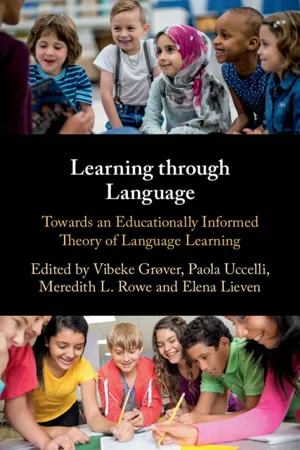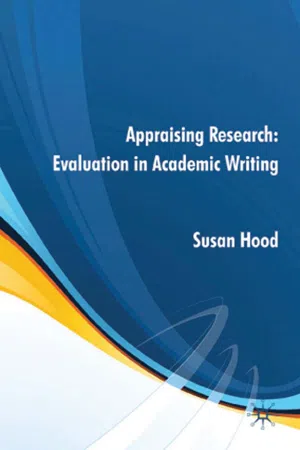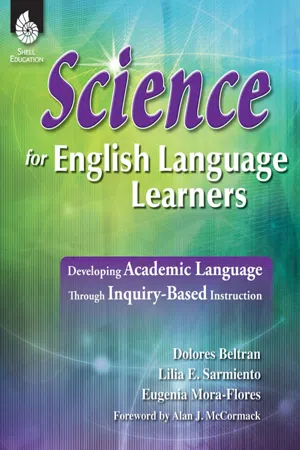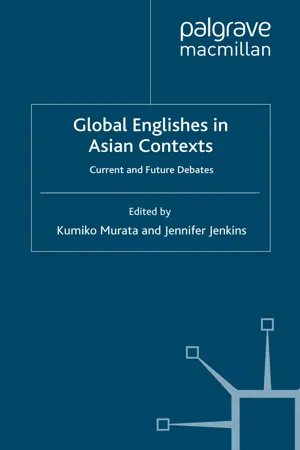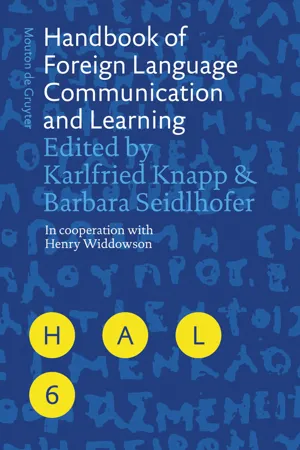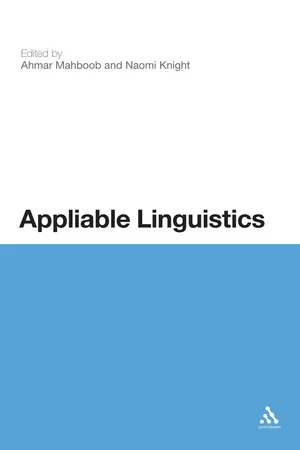Languages & Linguistics
Academic English
Academic English refers to the formal, precise, and structured style of English used in educational and scholarly settings. It encompasses the language and writing conventions necessary for academic success, including clarity, coherence, and adherence to academic standards. Proficiency in academic English is essential for effective communication and the production of scholarly work in various academic disciplines.
Written by Perlego with AI-assistance
Related key terms
1 of 5
10 Key excerpts on "Academic English"
- eBook - PDF
Learning through Language
Towards an Educationally Informed Theory of Language Learning
- Vibeke Grøver, Paola Uccelli, Meredith Rowe, Elena Lieven(Authors)
- 2019(Publication Date)
- Cambridge University Press(Publisher)
Cross-disciplinary, academic language instead refers to the language forms and functions that are used to fulfil goals shared across disciplines, such as precise and concise communication or explicit marking of conceptual rela- tions and of reflective perspectives (Bailey, 2007; Hyland, 2009; Schleppegrell, 2004; Snow, 2010; Snow & Uccelli, 2009). There is, however, no clear-cut way of defining academic language, and the term itself often raises controversy from authors who rightly point to the erroneous and educationally dangerous mis- conception of academic language as a superior language variety (e.g. Gee, 2014; Valdes, 2004). In response, it is important to emphasize that we view academic discourses as ‘cultural manifestations valued by academic institutions embedded in larger socio-political and historical structures’ (Uccelli, Phillips Galloway, & Qin, in press). In other words, we view academic language as a pragmatic solution to a particular situational context. Three important considerations are worth highlighting. Firstly, rather than categorical notions, each of these three concepts falls within a continuum from less to more extended, from contextualized to decontextualized and from more colloquial to more academic discourse (Snow & Uccelli, 2009). The two ends of the continua differ in the demands of the message and audience and, consequently, in the language required to address those demands. At one end, not-extended, contextualized, colloquial language occurs in exchanges with a face-to-face audience about concrete entities or events (e.g. ‘Could you pass the salt, please?’ during a dinner table conversation). At the other end, extended, decontextualized, academic language occurs in exchanges with intangible audiences typically about non-present events, entities, or ideas and requires drawing on more advanced lexical, morphosyntactic and discourse resources (Uccelli, Demir, Rowe, Goldin-Meadow, & Levine, 2018). - Julieta Arjona Sumague(Author)
- 2019(Publication Date)
- Society Publishing(Publisher)
It facilitates international mobility of young researchers. It is the preferred language for many international scholarly journals. Hence it is becoming increasingly important for researchers to learn the nuances of the language. Acquisition of English as a second language is on the rise among research students globally due the various advantages it has. Academic English for Research in Second Language Learners 149 7.3. Academic English IN RESEARCH FIELD The use of colloquial English in day-to-day life is quite distinct from the language used in research work. Researchers must possess a knowledge of Academic English for reading and understanding the study materials and reproduce ideas and thoughts in their work. Academic English is used in the field of research for describing a situation, process or explain how something works. Language used in research work is lucid, brief and accurate so that the reader does not misinterpret. Precise vocabulary is favored over slang, colloquial words and journalistic expressions. Researcher should be able to use the language to express opinions, ideas and insights about their work. Only then they will be able to disseminate their research findings and results to other people in their field. Researchers need to develop 4 basic skills of the language namely Listening, Speaking, Reading and Writing. This is important because in order to gain knowledge about their subject, comprehending what the lecturers and speakers are saying is important. The researchers must extensively study the work published in their field and all other information available to become subject matter experts. Good understanding of English is required for reading purposes. Researchers have to interact with fellow researchers, teachers and other subject matter experts during the course of their studies and work. Above all, the objective of every researcher is to publish their work and share it with the community.- S. Hood(Author)
- 2010(Publication Date)
- Palgrave Macmillan(Publisher)
Evaluation in Academic English 3 unfamiliar, unlearnt language for many students, including those who are native speakers of the language of instruction. In the context of Academic English, a second key factor is the grow- ing number of students internationally who are undertaking stud- ies in English as a second or foreign language, at undergraduate or at postgraduate level. This includes students from language backgrounds other than English who choose to study abroad or take distance degrees through universities based in English-speaking communities, or who attend institutions in non-English-speaking communities where the medium of instruction is English. Here the issue is not only one of unfa- miliar genres and registers, but of negotiating and constructing these texts in a second or foreign language. And while the academic language support needs of the student body are often emphasised (e.g. Ravelli & Ellis 2004; Bunton 2002), similar issues frequently confront a rap- idly expanding number of academics internationally who want to, or feel pressure to, publish their research in English language publications (Flowerdew 1999, 2001; Burrough-Boenisch 2003). The project here is to analyse evaluative discourse in the context of academic research writing in English in order to make the nature of the discourse more apparent and accessible. However, the aim is not sim- ply to explicate texts in order for novice writers to be able to reproduce them more readily. A further objective is to make the discourse more transparent, to be able to reveal the ways in which academic argument and academic knowledge are socially constructed in and through dis- course in dialogue with other knowledge and other knowers. In other words the aim is to further our understanding of what it means to mean in an academic sense.- eBook - PDF
Standards of English in Higher Education
Issues, Challenges and Strategies
- Neil Murray(Author)
- 2015(Publication Date)
- Cambridge University Press(Publisher)
There it is described as follows: the ability of students to use the English language to make and communicate meaning in spoken and written contexts while completing their university studies. Such uses may range from a simple task such as discussing work with fellow students, to complex tasks such as writing an academic paper or delivering a speech to a professional audience. This view of proficiency as the ability to organise language to carry out a variety of communication tasks distinguishes the use of ‘English language proficiency’ from a narrow focus on language as a formal system concerned only with correct use of grammar and sentence structure. The project Steering Committee recognises that in many contexts the terms ‘English language proficiency’ and ‘English language compe- tence’ are used interchangeably. (DEEWR, 2009, p. 1) While the IEAA notes that this definition is intended as a working definition for the non-specialist and acknowledges the efforts of the GPP’ s authors to move beyond the sometimes overly narrow conception of proficiency as comprising the ‘more atomistic levels of language related to sentence level grammatical competence’, and to contextualise ELP within the university setting, it none- theless offers little to elucidate and provide a more sophisticated understanding of the construct. Particularly significantly, as the IEAA report observes, DEEWR’ s definition has ‘been criticised for its failure to capture important distinctions between ELP and academic literacy, (Harper, Prentice and Wilson, 2011; Murray, 2012). The need for such a distinction will form an important part of the discussion in this chapter. - eBook - PDF
Science for English Language Learners
Developing Academic Language Through Inquiry-Based Instruction
- Dolores Beltran, Lilia Sarmiento, Eugenia Mora-Flores(Authors)
- 2012(Publication Date)
- Shell Education(Publisher)
Such perceptions demonstrate a lack of understanding of the challenge inherent in the complexity of developing academic language proficiency . Communicative competencies such as using complete sentences, expanded vocabulary, and conditional tenses are requisite skills for academic language proficiency . Native English speakers naturally take these language competencies for granted . English language learners must acquire these assumed competencies prior to or at the same time as they master English language arts and content-area standards . They must also apply their limited language competencies to learn challenging grade-level content with equal success as their native English-speaking peers . In most cases, it takes English language learners as long as five to seven years to develop the same level of depth and breadth of language and academic skills as their native English-speaking peers (Collier and Thomas 1999; Cummins 1989) . Much of what we understand about what it means to become proficient in a second language comes from the extensive work of Jim Cummins (1981, 1986, 1989, 1994a, 1994b, 1996, 2000, 2001, 2003, 2005) . Cummins (2005, 7–9) describes language proficiency in terms of three dimensions: conversational fluency, discrete language skills, and academic language proficiency . He views the development of these dimensions as a dynamic, interconnected process: They [the three dimensions] develop concurrently, and at various stages of development will correlate with one another . However, they also behave differently from one another—with respect to when they reach a developmental 23 plateau, to the kinds of experiences and instruction that promote each dimension, to the communicative contexts in which they are likely to be exhibited, and to the components of language on which they rely . Conversational English Fluency Conversational fluency is the ability to have a meaningful conversation with a native speaker in a social setting . - eBook - PDF
Language in Education
Social Implications
- Rita Elaine Silver, Soe Marlar Lwin(Authors)
- 2013(Publication Date)
- Bloomsbury Academic(Publisher)
7 How Is Language Used for Learning? Rita Elaine Silver, Raslinda A. R. and Galyna Kogut INTRODUCTION Chapter 1 of this book notes that language is pervasive in our lives. It is also pervasive in classes – language classes and classes for other academic subjects. However, language use in classes has some special features which are different to language use at home. In addition, while students are still developing and refining language proficiency and skills, they are also developing language for study of academic subjects. Thus, part of learning to be successful in school is learning how to use school language, or academic language as we usually call it. For example, referring to mathematics knowledge and English language learners (or, as they call them, Limited English Proficiency [LEP] students), Secada and Carey wrote more than 20 years ago that many teachers (and researchers) confound how people use mathematical language with actual knowledge of mathematics. People who sound like they know what they are talking about are judged to have knowledge, LANGUAGE IN EDUCATION 126 while those who don’t express themselves well are judged not to have such knowledge. However, if the best practices begin where students are academically, then teachers of LEP [Limited English Proficiency] students need to begin not only with what students understand but also with how they can express their understandings. Further, teachers should help students develop both mathematical understanding and its communication. (1990, p. 3) This is still something teachers need to be aware of – for every subject they teach. Therefore, this chapter deals explicitly with language in educational contexts and in particular with classroom talk. This is because most classroom lessons rely on talk for teaching and learning. Ideas that we are trying to teach are introduced through talk and language itself is often taught through classroom talk. - eBook - PDF
Global Englishes in Asian Contexts
Current and Future Debates
- K. Murata, J. Jenkins, K. Murata, J. Jenkins(Authors)
- 2009(Publication Date)
- Palgrave Macmillan(Publisher)
Part III Englishes in Asian Academic and Business Contexts 8 Academic Writing in World Englishes: The Asian Context Yamuna Kachru 111 Introduction It is evident that children acquire language in the course of their overall development through infancy to pre-teen years unless there are physio- logical (e.g. total loss of hearing) or environmental causes (e.g. forced isolation of the child) that prevent such acquisition. However, the lin- guistic competence acquired in natural socio-cultural settings does not necessarily include literacy skills. These skills depend on socio-cultural traditions that include writing in addition to oral performances of vari- ous sorts, e.g. in the community (i.e. community meetings), religious events (reading and writing of scriptures, delivering sermons, etc.) and ritualistic acts (performing specific rites according to manuals of the tradition). Competence in writing is acquired with deliberate effort in institutional settings such as the family, the school, the monastery, or wherever. It involves instruction and, usually, practice over a long period of time, and the rate of success in achieving writing competence varies considerably within any given population. Each literate culture has its own conventions of writing, and it is instructive to look at these closely if one is interested in understanding the process of writing, the cultural context of the product, and the cultural value assigned to writing. This paper has a limited goal of exploring the interaction of cul- ture and conventions of writing in order to understand the current concern with writing in English all across the world, especially in aca- demic settings. 1 Within academic writing the study of manifestation(s) of the genre, or set of genres, of academic writing across languages and cultures absorbs a great many professionals in English studies. The focus of this paper is on writing across disciplines, including those - Karlfried Knapp, Barbara Seidlhofer, Karlfried Knapp, Barbara Seidlhofer(Authors)
- 2009(Publication Date)
- De Gruyter Mouton(Publisher)
526 Claus Gnutzmann Since the linguistic focus of CLIL is on the foreign language, it has been em-phasised that learners’ use of the mother tongue should not be totally excluded from CLIL classes, and that students should also master the relevant subject terminology in their mother tongue. On a critical note, it has been argued that an increase in CLIL and therefore an increase in English-taught subjects could result in a possible decline of the status and significance of the national lan-guage as the language of education at schools and in higher education. 3.2. English for Academic Purposes English for Academic Purposes (EAP) is a sub-branch of ESP which is con-cerned with the identification of students’ (special) communication needs and study skills in (pre-)tertiary education as well as with the analysis of linguistic and discoursal structures used in academic texts. In contrast to LSP, EAP does not so much deal with the forms and functions of language in certain disciplines but mainly with language and academic skills which enable learners to com-municate in a greater variety of contexts and subjects. Therefore, a general ap-proach to an EAP course does not concentrate on the topics and issues of a par-ticular field but puts more emphasis on the teaching of overall study skills such as listening to lectures, reading, note-taking and writing (cf. Hamp-Lyons 2001: 126–127). Thus, EAP-learners’ ability to communicate outside the ‘specialist’ communities is not restricted, as might be the case with other LSP learners who may find it difficult to communicate in the general language. In line with the spread of English world-wide EAP is used in English-speak-ing countries as well as in countries where English is spoken as a second or official language (ESL) and as a foreign language (EFL). Dudley-Evans and St John (1998: 35) suggest a distinction according to four types of situation: “1. An English-speaking country, such as UK or USA. “ 2.- eBook - PDF
- A. Suresh Canagarajah(Author)
- 2002(Publication Date)
- University of Pittsburgh Press(Publisher)
In Europe, Asia, South America, and Africa the teaching of academic writing is not done in a systematic or institu-tionalized manner. Though I draw from the work of compositionists to discuss the conventions of periphery disciplinary communities and their academic writing, I focus on the actual writing done by professionals in such periphery institutional contexts. In an indirect compliment to the field of composition, I show why periphery scholars have to be concerned about the developing knowledge on academic writing. The marginaliza-tion of their scholarship may result partly from not taking the practice of academic writing seriously. Another field that informs the study of academic writing is constituted by second language teachers. These professionals are engaged in work falling into disciplines like applied linguistics, English for Academic and Specific Purposes (EAP/ESP), and bilingual literacy. Since the primary area for work of these scholarly groups is the teaching of academic literacy to non-native students, they have studied the conventions and processes of writing in a comparative sense. Developing a keen sensitivity to issues in contrastive linguistics and contrastive rhetoric, they have formulated a stock of knowledge on how di ff erent linguistic and cultural groups con-struct texts (Connor ; Fox ; Purves ; Swales ). Such an orientation will prove useful for studying the discursive di ff erences of pe-riphery scholars. Needless to say, the constructs of these circles will have to be consider-ably expanded and, in some cases, critically reformulated to help explore academic writing from a geopolitical perspective. Crucial notions for composition scholars—like discourse conventions, discourse communities, 44 Contextualizing Academic Writing and literate practices—will have to be reinterpreted in order to develop this orientation. - eBook - PDF
- Ahmar Mahboob, Naomi K. Knight(Authors)
- 2010(Publication Date)
- Continuum(Publisher)
The model of domains underpin-ning the 3 × 3 draws on this theoretical work to explore literacy practices within and beyond formal educational contexts (e.g. Humphrey, in press). It proposes four loosely bounded domains of learning within the wider culture, each of which privileges its own set of genres and registers. These domains and their communicative purposes are outlined in Figure 11.2. The academic domain, the site of formal education at the primary, secondary and particularly tertiary level, is characterized across disciplines by language 188 Appliable Linguistics Figure 11.1 The 3×3: a framework for describing linguistic resources of student writing in the academic domain The 3×3: Setting Up a Linguistic Toolkit 189 which is increasingly technical and grammatically metaphorical and which recongures (i.e. generalizes and systematizes) everyday experience (Halliday, 1991, pp. 22–3). Importantly, roles in the academic domain are traditionally hierarchical, with teachers as socially distant experts, instructing and assessing students, who are expected to construct themselves in objective terms (Macken-Horarik, 1996, p. 238). Genres which are privileged in the academic domain are those which are written (in either electronic or print form) and which allow students to both access and demonstrate their learning of the recongured experience of par-ticular disciplines. Persuasive genres which demonstrate a critical orientation to learning, such as analytical exposition, discussion and challenge are privi-leged in part because the evidence included in these genres displays knowledge built from authoritative sources. The focus on displays of learning distinguishes persuasive genres in the academic domain from those produced in the civic domain (e.g. hortatory exposition) which are more directly oriented towards producing social change (Humphrey, in press).
Index pages curate the most relevant extracts from our library of academic textbooks. They’ve been created using an in-house natural language model (NLM), each adding context and meaning to key research topics.
